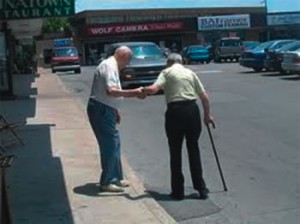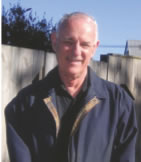Talking about spirituality today – 8 – Ministry and Leisure
Five Gospel Loves: Ministry and Leisure
We have discussed self-acceptance/self-denial and prayer/humour. We come to the third Gospel love - ministry and leisure.
Ministry
‘Ministry’ is used here not to describe those with public roles in the Church’s life – priests, religious or ‘lay’ ministers. The word denotes the other side of the universal call to holiness. Everyone, whatever their vocation or stage of life is meant to ‘put on the mind of Christ.’ This is the heart of Christian Spirituality.
Putting on ‘Christ’s mind’ also entails sharing his heart and his hands. We are to bring Jesus to others and to bring others to Jesus. After his resurrection, Jesus sent his followers to proclaim the good news of God’s mercy and saving love to the whole world. In other words, every Christian is called to share in the mission and the ministry of Jesus continued in the life of the Church.
So ministry is not just about working in church-related activities. It is about the spiritual life and its practice, as Wilkie Au notes, ‘in the marketplace or in the home’ (35). It involves a conscious effort to follow Jesus and continue his actions on behalf of others. In other words, the task is to cooperate with the Spirit of Jesus to bring about a better world, namely, God’s world. This is ministry.
Our ministry, like that of Jesus, can be viewed under three aspects. This reflects the early Church community, often summed up in three Greek words: kerygma (proclaim the Gospel or the language of words); koinonia (a loving community or the language of relationships); diakonia (service of others or the language of works). Let’s talk about these.
The language of words
Sharing one’s faith is not principally about public preaching or teaching. We all ‘proclaim’ the Gospel through many forms of ‘words.’ It may be parents teaching their children to pray or about doing the ‘right’ thing.
It is found when husbands and wives give each other daily expressions of love, thoughtfulness and encouragement –especially in difficult times. It may be adult children reassuring their aging and sick parents or friends listening with a sympathetic ear. 
In the language of kerygma, such words and attitudes give witness to God’s love, fidelity and forgiveness.
The language of relationships
Think of what parents are prepared to do for their children? There are long nights beside the bed of a sick child. Parents stand by their growing or adult children when they make mistakes, or their lives somehow fall apart. There are friends on whom we can always rely.
These relationships reveal something of the God who is always faithful. Au cites a passage from Alice Munro’s The Color Purple. Shug’s down-to earth comments are worth remembering about how we minister through relationships (the language of koinonia):
‘Celie, tell the truth, have you ever found God in church? I never did. I just found a bunch of folks hoping for him to show. Any God I found in church, I brought in with me. And I think all other folks did too. They come to church to share God, not find God’ (37).
The language of works
Jesus’ cure of the leper (Mark 1: 4-45) offers an insight into how Jesus engages with people in his ministry. He is sensitive to the needs of those around him. He allows what he sees stir him to compassion. Finally, he is moved to act.
These three phases shape how relationships affect us such that we respond and move to action. In this way, notes Au, the risen Lord ‘continues his ministry of freeing and healing people’ (38).
 Action has a variety of forms in church or community involvement. If the Good Samaritan is the Christian model, ultimately nothing replaces being a good neighbour -- being on the doorstep with a casserole for the family in our street that has had a death, or where the dad has just lost his job.
Action has a variety of forms in church or community involvement. If the Good Samaritan is the Christian model, ultimately nothing replaces being a good neighbour -- being on the doorstep with a casserole for the family in our street that has had a death, or where the dad has just lost his job.
Perhaps the most needed ‘ministry’ in today’s increasingly busy world is to ‘waste time’ with people. It means being ready to just ‘be there’, spending time and listening with a sympathetic ear over a cup of tea.
Nothing replaces face-to-face contact between people (we can’t hug our computer or hold our mobile phone’s hand). But it is amazing the reassuring effect of a quick phone call or a brief email or SMS message.
What we do for others affects us - as seen in Wordsworth’s memories in his poem Tintern Abbey.
…feelings too
Of unremembered pleasure: such, perhaps,
As may have had no trivial influence
On that best portion of a good man’s life,
His little, nameless, unremembered, acts
Of kindness and of love
Leisure
 The other side to ministry is leisure. To give something of ourselves, we must have a self to give. Jesus calls his working companions to ‘come apart and rest for a while.’
The other side to ministry is leisure. To give something of ourselves, we must have a self to give. Jesus calls his working companions to ‘come apart and rest for a while.’
We need to stop, give time for ourselves and our loved ones. That means having hobbies and other interests. It’s also OK to ‘waste time’ doing nothing. Without play we will lose the desire to pray.
Without rest and leisure, I will have a depleted self. It is a sure recipe for being a workaholic and for burnout. For people in public roles, this can easily lead to dysfunctional and, sometimes, harmful and abusive behavior in their ministry.
Oddly, we live in a society that works at leisure, at discovering ways of relaxing. Think of the TV advertising devoted to the nirvana of the long weekend. And, of course, everyone else wants to ‘get away from it all.’ Again, ironically, we sit back and ‘relax’ - gritting our teeth and gripping the steering wheel as we snake our way in the lines of traffic to and from our destination….
Leisure and rest are deep in the Jewish and Christian story. Look at the first account of Creation in the Book of Genesis Chapter 1. Its repetitive and rhythmical structure indicate its origin in a liturgical ritual. Each ‘day’ in the story has a regular narrative pattern ending in the refrain ‘and God saw that it was good.’
But note the Chapter’s close. With the work of Creation completed, the Lord God ‘rested on the seventh day.’ The telling sentence is the final one: ‘God blessed the seventh day and made it holy, because on that day he had rested after all his work of creating.’
God’s work reaches its climax with God surveying and rejoicing in all his ‘very good’ creation. The Sabbath is the holy day because it is the day on which God rested. The Sabbath is primarily about resting. That is why it is a day that is holy – ‘set apart’ to remember God in worship. And, in the Bible, to remember is to be faithful.
In other words, we can pray only when we rest and play. The day of rest, whether the Sabbath or the Christian Sunday keeps us both humanly and religiously balanced.
When we stop and rest, we can reflect, can keep things in proportion. We can see life and work, money and possessions, relationships and ourselves against the bigger picture, namely, in the light of God and God in the light of them. Anthony de Mello SJ sums this up in the Contented Fisherman.
The industrialist was horrified to find the fisherman lying beside his boat, smoking a pipe.
‘Why aren’t you out fishing?’ said the industrialist.
‘Because I have caught enough fish for the day.’
‘Why don’t you catch some more?’
‘What would I do with it?’
‘Earn more money. Then you could have a motor fixed to your boat and go into deeper waters and catch more fish. That would bring you money to buy nylon nets, so more fish, more money. Soon you would have enough money to buy two boats…even a fleet of boats. Then you could be rich like me.’
‘What would I do then?’
‘Then you could really enjoy life.’
‘What do you think I am doing now?’
Next Month: Friendship and Generativity
Sources:
Wilkie Au, By Way of the Heart: Toward a Holistic Christian Spirituality (Paulist, 1989)
Anthony de Mello SJ, The Song of the Bird (Anand Press, India, 1987).


 Entries(RSS)
Entries(RSS)